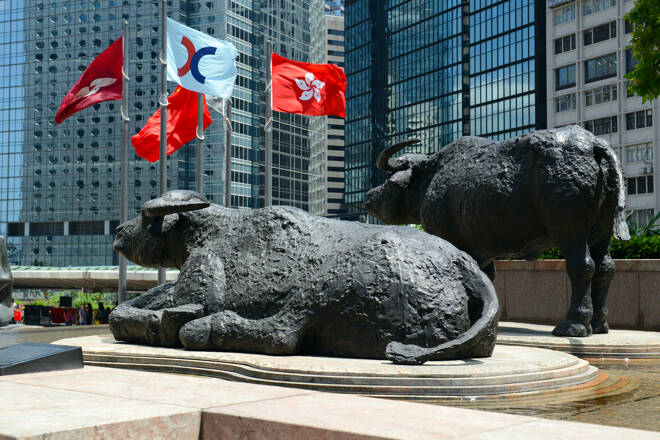Advertisement
Advertisement
Hang Seng Index, ASX 200, Nikkei Index: Asian Markets Plunge Amid US Recession Fears
By:
Key Points:
- On Monday, August 5, the Nikkei slumped, with the ASX 200 and Hang Seng Index also seeing heavy losses.
- Fears of a US economic recession swept across the Asian equity markets following Friday’s US Jobs Report.
- The Mainland China equity markets bucked the trend on a better-than-expected Services PMI.
Nasdaq Tumbles on Unexpected Jump in Unemployment
On Friday, August 2, the US equity markets extended their losses from Thursday, August 1. The Nasdaq Composite Index slid by 2.43%, while the Dow and the S&P 500 ended the session down 1.51% and 1.84%, respectively.
10-year US Treasury yields slumped by 184 basis points to 3.794% as US recessionary fears fueled a flight to safety.
US Jobs Report Spooks Investors
The US unemployment rate unexpectedly jumped from 4.1% in June to 4.3% in July, fueling fears of a US economic recession. A deteriorating US labor market could lower wage growth and disposable income, dampening consumer spending and demand-driven inflation.
A softer inflation outlook could support multiple 2024 Fed rate cuts. However, a slump in consumer spending could also impact the US economy. Private consumption contributes over 60% to the economy.
Wage growth trends also signaled a likely pullback in consumer spending, rising by 3.6% year-on-year in July, down from 3.8% in June.
Expert Commentary
Arch Capital Global Chief Economist Parker Ross commented on the US Jobs Report, saying,
“The 1-month private sector job diffusion index, which measures the share of industries recording an expansion of payrolls during the most recent month, dipped below 50 for the first time since the pandemic in July to 49.6 […]. Typically, the 1-month index has been at 42.7 at the onset of recessions vs 50.7 for the 6-month, so there’s still some time but we’re approaching concerning levels quickly.”
China Services PMI Offers Relief
China’s Caixin Services PMI increased from 51.2 in June to 52.1 in July, easing fears of a more marked slowdown in economic growth. Domestic demand supported the upswing as new export business expanded at the slowest pace in 11 months.
Caixin Insight Senior Economist Dr. Wang Zhe commented on the July survey, saying,
“Growth in supply and demand picked up pace. Amid continued market improvement, business activity, and total new orders both grew for the 19th month in a row, increasing at a faster pace than the previous month. Tourism footfall from overseas increased. External demand expanded, keeping the corresponding gauge in expansionary territory for the 11th straight month.”
Hang Seng and Mainland China Markets Diverge
Meanwhile, the Hang Seng Index fell by 0.99% on Monday morning, with tech and real estate stocks contributing.
The Hang Seng Tech (HSTECH) Index slid by 1.02%. Baidu (9888) tumbled by 2.57%, while Alibaba (9988) and Tencent (0700) fell by 1.19% and 0.70%, respectively.
The Hang Seng Mainland Properties Index (HSMPI) declined by 0.64%.
Mainland China’s equity markets responded to the better-than-expected Caixin Services PMI. The CSI 300 and the Shenzhen Composite Index were up by 0.21% and 0.03%, respectively.
Nikkei Index Extends Losses on Yen Surge
The Nikkei Index tumbled by 5.60% on Monday morning, extending its losses from Friday. Wednesday’s Bank of Japan pivot and flight-to-safety drove Yen demand, impacting Nikkei-listed export stocks. The USD/JPY was down 0.86% to 145.203 on Monday, following a 1.91% loss from Friday.
Tokyo Electron Ltd. (8035) and Softbank Group Corp. (9984) were among the worst performers, sliding by 9.13% and 7.27%, respectively.
ASX 200 Slides on Global Slowdown Fears
The ASX 200 Index tumbled by 2.84% on Monday morning. Gold, mining, oil, and tech stocks contributed. The S&P ASX All Technology Index (XTX) slumped by 4.36%.
Mining giant BHP Group Ltd (BHP) was down 1.63%, respectively, while Woodside Energy Group Ltd (WDS) slid by 2.11%. National Australia Bank (NAB) tumbled by 3.75%.
Investors should remain alert amidst economic growth fears. Closely monitor the news wires, real-time data, and expert commentary to manage trading strategies accordingly. Stay informed with our latest news and analysis to manage positions across the Asian equity markets.
About the Author
Bob Masonauthor
With over 28 years of experience in the financial industry, Bob has worked with various global rating agencies and multinational banks. Currently he is covering currencies, commodities, alternative asset classes and global equities, focusing mostly on European and Asian markets.
Advertisement
